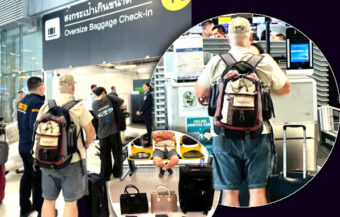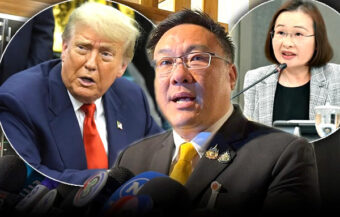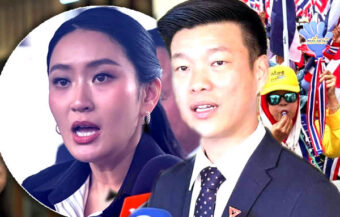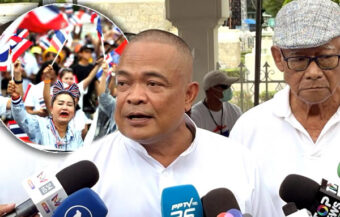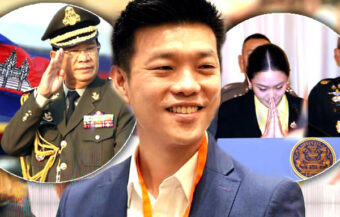Prime Minister Srettha envisions Thailand as a World aviation hub. On Wednesday, he spoke of a reciprocal visa exemption deal with the European Union. The PM, emphasising tourism, praised Suvarnabhumi Airport’s success. At the same time, he highlighted past governments led by Thaksin Shinawatra and their dynamic strategies.
The Thai Prime Minister, on Wednesday, outlined another vision. Addressing an audience in Bangkok, Mr Srettha Thavisin proposed building on the government’s recently agreed mutual visa waiver with China, by seeking a similar agreement with the European Union in relation to the Schengen zone to allow visa-free travel in both directions. In turn, this could be used to develop Bangkok as a global transport hub.
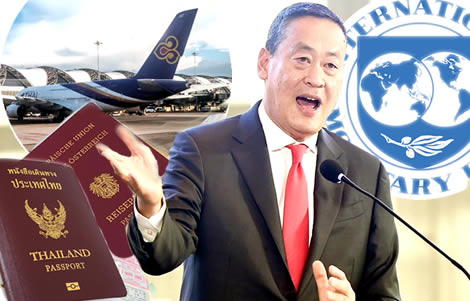
Prime Minister Srettha Thavisin has set out a vision of Thailand as an World aviation hub. The PM, on Wednesday, said he was seeking to hold talks with European countries for reciprocal visa exemptions.
He was speaking at an event in Bangkok at the King Power Hotel hosted by the Matchicon media group.
Srettha emphasised foreign tourism in the same week that the IMF warned that the country could become too dependent on the industry in its latest report
In his keynote speech delivered at ‘Thailand 2024 The Great Challenges’, the premier highlighted the importance of tourism. At length, he declared it one of the government’s core priorities.
Mr Srettha said several measures including visa exemption programmes would help boost the industry in Thailand.
He confirmed Thailand and China will sign a reciprocal visa exemption programme this week. In turn, the government will pursue talks with the European Union over a similar deal between Thailand and Schengen countries.
Accordingly, Mr Srettha said his government will upgrade the country to a global aviation hub.
In addition, that ambition would involve streamlining immigration procedures, overhauling flights and building airports in secondary cities.
PM spoke of Suvarnabhumi Airport as a success, highlighting the dynamic risk-taking strategy of governments led by ex-Prime Minister Thaksin
The PM, in particular, cited the economic and other opportunities afforded to Thais by key large-scale mega projects.
At the same time, he cited past governments of Thaksin Shinawatra. Mr Srettha for instance singled out the decision to proceed with the construction of Suvarnabhumi Airport.
Previously, that decision was one that generated significant political controversy and opposition. Even when the airport finally opened in September 2006, it coincided with a coup d’état that removed the former premier.
Undeniably, when opened, conservative politicians and ‘Yellow Shirt’ protesters viewed the airport as a white elephant. After that, it took off and reached the limits of its capacity.
Questions about the viability of Srettha’s land bridge arise despite Monday’s euphoric briefings in Ranong
Thailand, China forge closer ties with permanent visa-free access between both countries on March 1st 2024
Questions asked about the Thai Chinese visa waiver scheme ahead of high profile visit to Beijing to sign the deal
Last year, the government announced a ฿35 billion expansion to the facility. In effect, this will boost passenger traffic by 33% from 45 million to 60 million.
‘Over the past two decades we had governments that saw opportunities and seized them,’ Mr Srettha said on Wednesday.
Comparison made to the Land Bridge initiative
Likewise with the Land Bridge megaproject.
Mr Srettha once again promised to listen to opinions from all stakeholders including potential investors and local residents.
In summary, the ฿1-trillion project aims to develop a logistics network connecting Ranong with Chumphon. Therefore connecting the Gulf of Thailand with the Andaman Sea.
It was showcased at three international events: the APEC Summit in San Francisco, the ASEAN-Japan Commemorative Summit in Japan and the 2024 World Economic Forum in Davos, Switzerland.
‘We listen to not only the public but also investors. It’s the government’s job to weigh if what they want is positive or negative for the people,’ Srettha said.
Mega projects bring opportunities to the country
He urged concerned parties to think about the opportunities the Suvarnabhumi airport has brought to the country. He said this should be remembered when considering the Land Bridge project.
At the same time, he insisted the government welcomes investors from every country equally.
Mr Srettha also touched on the policy of tripling farmers’ incomes in four years.
However, he said this would be achieved without intervening in prices or by offering subsidies. Instead, more opportunities will be created through product development, he claimed.
IMF’s latest report appears to echo the central bank. It warns against a lack of fiscal discipline and also, significantly, speaks of a dependence on tourism
The Prime Minister’s vision comes just days after the International Monetary Fund (IMF) published its latest paper on Thailand. It was released on Monday.
The international finance agency warned that the kingdom may become too dependent on foreign tourism. It pointed to the danger of a geopolitical emergency suddenly impacting the industry.
It’s not an economic crisis, it’s a quagmire of structural problems that cannot be fixed overnight
The IMF also appeared to come down on the side of Bank of Thailand Governor Sethaput Suthiwartnarueput in his tussle with the PM.
The body emphasised that financial stability must be the key priority for Thailand at this time.
Economic malaise caused by structural problems
In addition, the IMF warned of the threat of a ‘lack of fiscal discipline’ if a more expansionary policy is pursued.
It urged the central bank to be ready to tighten monetary policy if inflation reemerges as a threat. Simultaneously, it predicted years ahead of low growth for the kingdom. In particular, it cited the downturn in the Chinese economy.
Certainly, as with the Bank of Thailand this week, it agreed that Thailand’s underlying economic malaise was caused by structural problems.
The country needs more inward investment to create a more productive and competitive economy, it concluded.
Join the Thai News forum, follow Thai Examiner on Facebook here
Receive all our stories as they come out on Telegram here
Follow Thai Examiner here
Further reading:
China’s Embassy calls on Thai media to censor its coverage of Taiwan to protect relationships
War with China is a rising spectre as US General predicts conflict by 2025
Bad news from Beijing with Xi’s rise, the prospect of war and a divided world have greatly grown
Abe’s legacy will be his efforts to awaken Japan and build a defensive alliance against China
Former Pheu Thai finance minister expresses unease about US regional moves to counter China’s rise
Prayut unveils 3 ‘R’ strategy for a deeper and broader partnership with the US on the economy
Thailand and Japan announce defence pact on visit by Japanese PM to Bangkok ahead of US summit
US ASEAN summit as ‘dangerous directions’ now emerging in Asia as China’s regional power rises
US sanctions on Russia part of a ‘profound’ geopolitical shift to Asia as many US firms leave China

